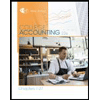
Fundamental Accounting Principles
24th Edition
ISBN: 9781259916960
Author: Wild, John J., Shaw, Ken W.
Publisher: Mcgraw-hill Education,
expand_more
expand_more
format_list_bulleted
Concept explainers
Textbook Question
Chapter 2, Problem 12QS
Preparing an income statement P3
Liu Zhang operates Lawson Consulting, which began operations on June 1. On June 30, the company's records show the following selected accounts and amounts for the month of June. Prepare a June income statement for the business.
Cash..........$5,000 L. Zhang, Withdrawals.......$ 1,500 Rent expense......$2,000Accounts receivable ........4,500 Service revenue.........12,000 Wages expense.........6,000 Accounts payable.......... 3,500 Equipment.........6,500
Expert Solution & Answer
Want to see the full answer?
Check out a sample textbook solution
Students have asked these similar questions
Solve this question accounting
Solve this question and accounting question
General accounting
Chapter 2 Solutions
Fundamental Accounting Principles
Ch. 2 - Prob. 1DQCh. 2 - What is the difference between a note payable and...Ch. 2 - Prob. 3DQCh. 2 - What kinds of transactions can be recorded in a...Ch. 2 - Are debits or credits typically listed first in...Ch. 2 - Should a transaction be recorded first in a...Ch. 2 - If assets are valuable resources asset accounts...Ch. 2 - Prob. 8DQCh. 2 - Prob. 9DQCh. 2 - Identify the four financial statements of a...
Ch. 2 - Prob. 11DQCh. 2 - Prob. 12DQCh. 2 - Prob. 13DQCh. 2 - Prob. 14DQCh. 2 - Prob. 15DQCh. 2 - Prob. 16DQCh. 2 - Prob. 17DQCh. 2 - Prob. 18DQCh. 2 - Identifying source documents C1 Identify the items...Ch. 2 - Identifying financial statement accounts C2...Ch. 2 - Reading a chart of accounts C3 A chart of accounts...Ch. 2 - Identifying normal balance C4 Identify the normal...Ch. 2 - QS 2–5
Linking debit or credit with normal...Ch. 2 - Prob. 6QSCh. 2 - Analyzing debit or credit by account A1 Identify...Ch. 2 - Prob. 8QSCh. 2 - Prob. 9QSCh. 2 - Prob. 10QSCh. 2 - Preparing journal entries P1 Prepare general...Ch. 2 - Preparing an income statement P3 Liu Zhang...Ch. 2 - Preparing a statement of owner's equity P3 Use the...Ch. 2 - Prob. 14QSCh. 2 - Prob. 15QSCh. 2 - Exercise 21 Steps in analyzing and recording...Ch. 2 - Prob. 2ECh. 2 - Exercise 2-3 Identifying a ledger and chart of...Ch. 2 - Prob. 4ECh. 2 - Prob. 5ECh. 2 - Prob. 6ECh. 2 - Prob. 7ECh. 2 - Exercise 28 Preparing Taccounts (ledger) and a...Ch. 2 - Prob. 9ECh. 2 - Exercise 2-10 Preparing a trial balance P2 After...Ch. 2 - Prob. 11ECh. 2 - Prob. 12ECh. 2 - Exercise 2-13 Entering transactions into...Ch. 2 - Exercise 2-14 Preparing general journal entries P1...Ch. 2 - Prob. 15ECh. 2 - Prob. 16ECh. 2 - Prob. 17ECh. 2 - Prob. 18ECh. 2 - Prob. 19ECh. 2 - Prob. 20ECh. 2 - Prob. 21ECh. 2 - Exercise 2-22 Calculating and interpreting the...Ch. 2 - Exercise 2-23 Preparing journal entries P1 Prepare...Ch. 2 - Prob. 1APSACh. 2 - Prob. 2APSACh. 2 - Prob. 3APSACh. 2 - Prob. 4APSACh. 2 - Prob. 6APSACh. 2 - Prob. 7APSACh. 2 - Prob. 1BPSBCh. 2 - Prob. 2BPSBCh. 2 - Prob. 3BPSBCh. 2 - Prob. 4BPSBCh. 2 - Problem 2-5B Computing net income from equity...Ch. 2 - Prob. 6BPSBCh. 2 - Problem 2-7B Preparing an income statement,...Ch. 2 - SP 2 On October 1, 2019, Santana Rey launched a...Ch. 2 - Using transactions from the following assignments...Ch. 2 - Prob. 2GLPCh. 2 - Prob. 3GLPCh. 2 - Prob. 4GLPCh. 2 - Prob. 5GLPCh. 2 - Prob. 6GLPCh. 2 - Prob. 7GLPCh. 2 - Prob. 8GLPCh. 2 - Refer to Apple's financial statements in Appendix...Ch. 2 - Prob. 2AACh. 2 - Key comparative figures for Apple, Google, and...Ch. 2 - Prob. 1BTNCh. 2 - Prob. 2BTNCh. 2 - Prob. 3BTNCh. 2 - Prob. 4BTNCh. 2 - Prob. 5BTNCh. 2 - Prob. 6BTNCh. 2 - Prob. 7BTN
Knowledge Booster
Learn more about
Need a deep-dive on the concept behind this application? Look no further. Learn more about this topic, accounting and related others by exploring similar questions and additional content below.Similar questions
- Oriole Company sells product 2005WSC for $55 per unit and uses the LIFO method. The cost of one unit of 2005WSC is $52, and the replacement cost is $51. The estimated cost to dispose of a unit is $6, and the normal profit is 40% of selling price. At what amount per unit should product 2005WSC be reported, applying lower-of-cost-or-market?arrow_forwardNonearrow_forwardGeneral accountingarrow_forward
arrow_back_ios
SEE MORE QUESTIONS
arrow_forward_ios
Recommended textbooks for you
 College Accounting, Chapters 1-27 (New in Account...AccountingISBN:9781305666160Author:James A. Heintz, Robert W. ParryPublisher:Cengage Learning
College Accounting, Chapters 1-27 (New in Account...AccountingISBN:9781305666160Author:James A. Heintz, Robert W. ParryPublisher:Cengage Learning College Accounting, Chapters 1-27AccountingISBN:9781337794756Author:HEINTZ, James A.Publisher:Cengage Learning,
College Accounting, Chapters 1-27AccountingISBN:9781337794756Author:HEINTZ, James A.Publisher:Cengage Learning, Financial And Managerial AccountingAccountingISBN:9781337902663Author:WARREN, Carl S.Publisher:Cengage Learning,
Financial And Managerial AccountingAccountingISBN:9781337902663Author:WARREN, Carl S.Publisher:Cengage Learning, Survey of Accounting (Accounting I)AccountingISBN:9781305961883Author:Carl WarrenPublisher:Cengage Learning
Survey of Accounting (Accounting I)AccountingISBN:9781305961883Author:Carl WarrenPublisher:Cengage Learning

College Accounting, Chapters 1-27 (New in Account...
Accounting
ISBN:9781305666160
Author:James A. Heintz, Robert W. Parry
Publisher:Cengage Learning

College Accounting, Chapters 1-27
Accounting
ISBN:9781337794756
Author:HEINTZ, James A.
Publisher:Cengage Learning,

Financial And Managerial Accounting
Accounting
ISBN:9781337902663
Author:WARREN, Carl S.
Publisher:Cengage Learning,

Survey of Accounting (Accounting I)
Accounting
ISBN:9781305961883
Author:Carl Warren
Publisher:Cengage Learning

The accounting cycle; Author: Alanis Business academy;https://www.youtube.com/watch?v=XTspj8CtzPk;License: Standard YouTube License, CC-BY